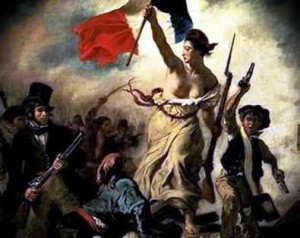 As a rule, Political Science considers revolutions in isolation from the moral qualities of people that make it, abstracts from them.
As a rule, Political Science considers revolutions in isolation from the moral qualities of people that make it, abstracts from them.
Moreover, even considering the revolution in moral categories the moral of revolutionaries as such remains outside its field of view (this cannot be said about fiction literature: let’s remember, for example, Dostoevsky’s “Demons”!). In this regard I believe that the time has come to give more attention to this problematics. Below I will try to formulate several key issues for its analysis.
So. Is the level of morale of revolutionaries qualitatively different from the level of moral of those whom they “lead” and, most importantly, those whom they “overthrow”? Or maybe political realists are right. I will remind that political realists believe that since personal moral and, so to speak, moral of “political act” correlate rather poorly the question of “comparing” of the moral character of revolutionaries and those whom they overthrow has no scientific meaning and interest. Further. All “great” revolutions somehow determine their attitude to religion.
Moreover, the most famous of the great revolutions, French and Russian, were sharply negative towards religion. In general, the relationship between moral and religion can be twofold.
1) Morality comes from religious beliefs. If so, then when religion loses its positions modern moral standards should lose their absoluteness, their imperativeness.
2) Modern morality and religion are essentially independent phenomena but they have a common origin. In this case the withering away of religion does not entail the total withering away of morality.
Although, of course, many of religion rules may lose their imperativeness. In the context of our main problem in relation to the first case the most obvious conclusion should be that both the Jacobins and the Bolsheviks acted as the destroyers of moral. For the second case it is not necessary. Moreover, revolutionaries can generally be seen as carriers of truly new, more progressive moral.
However, even in the first case everything is not so unambiguously “bad”. Here’s why. Since revolutionaries, as a rule, called for the establishment of a kingdom of justice, equality, etc., that is, in effect, for the establishment of Kingdom of God on Earth shouldn’t we regard them in this regard not so much as carriers of some fundamentally new moral but, on the contrary, as new adherents of “old” moral connected with or directly following from religion which they rejected (and which they associated with those who they tried to overthrow)?
To trace the mechanism of the formation of such morale of revolutionaries on historical examples, I believe, is a quite an achievable goal. I think that in the process we can also easily find the mechanism of revolutionaries’ anti-religious setting formation (while they keep or even hyper-develop their moral sensitivity, rigor – especially to themselves) and their strange blindness about the fact that their moral convictions came directly from basic postulates of religion which they so vehemently rejected. However, the solution of such a task, of course, is a matter of the future. An important question is moral of different generations of revolutionaries.
The commonplace is the phrase that “the Revolution devours its children”. One people begin revolutions, others finish. Is moral character of the first “echelon” of revolutionaries, that is, those who “undermine” foundations of the ruling regime, differ from moral character of those who “demolish” it (and those who then rule the state that emerged from the revolution)?
Finally, perhaps, here is one of the key issues related to the problem we consider. Is it possible that the revolutionaries, being, so to speak, “moral ascetics”, in the course of the revolution and due to the logic of the revolutionary process are forced to retreat from moral principles that they proclaimed when started the revolution and begin committing horrible acts? Do they turn into “moral cripples” or they are such people from the very beginning? I hope this brief review is capable to give an idea of both the relevance and the breadth of the problem raised.
Author Shvyrkov Alexander
